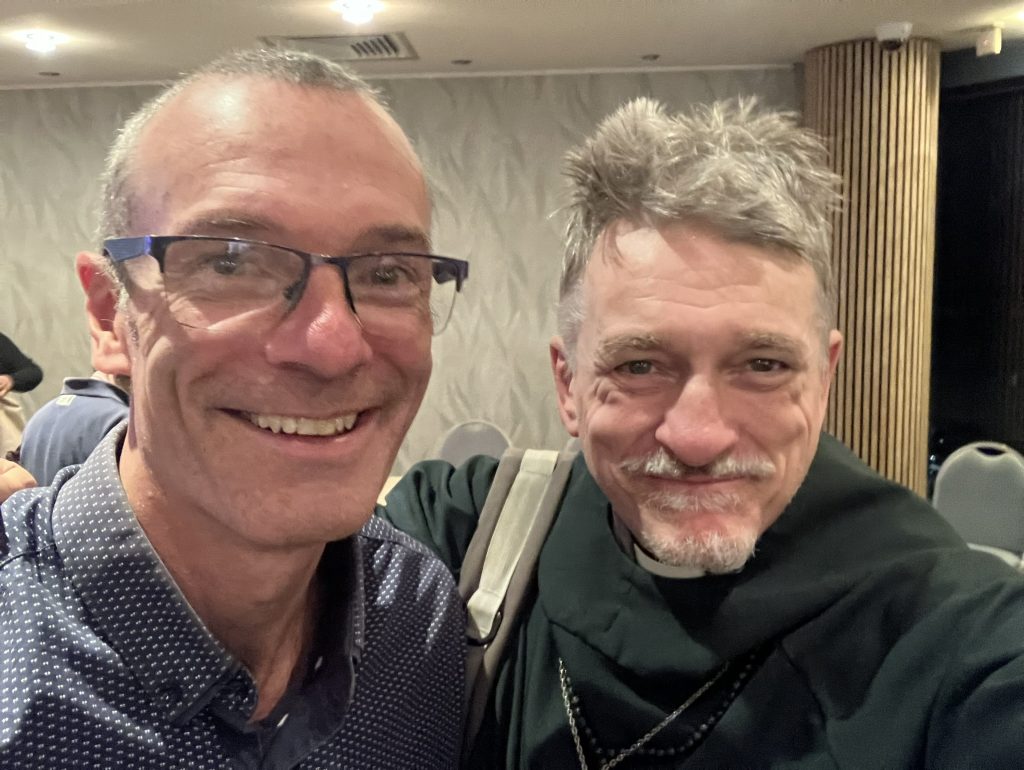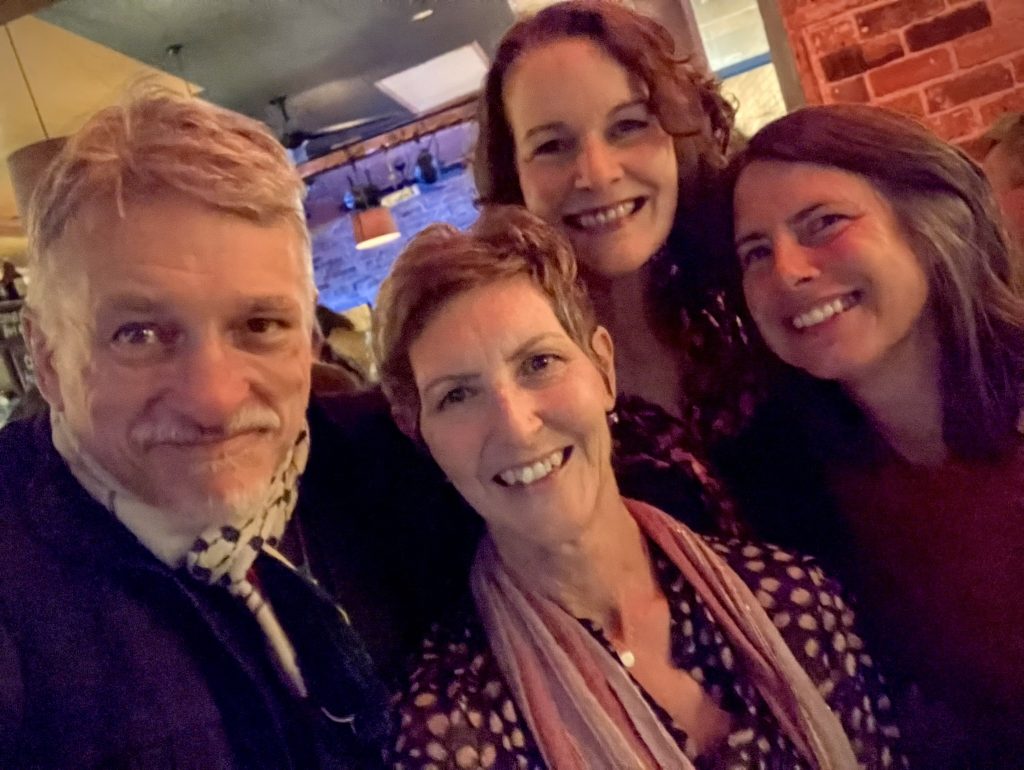“Can anyone withhold the water for baptizing these people who have received the Holy Spirit just as we have?” (Acts 10:47)
Greetings, Fighter,
You’ll have to forgive me if our opening verse today looks a lot like last week’s. Our stories from the Acts of the Apostles are following the explosive growth of the early Christian community and there are lots of baptisms.
I’ve heard church growth specialists frame these stories as if the Apostles were savvy first century entrepreneurs, launching a new product. The message of the risen Jesus was selling fast! If only priests and pastors would adopt similar strategies today, we too would experience explosive growth in our churches!
I won’t comment further on why or how (or whether) we should grow our churches. I will say though that the depiction of the Apostles as shrewd marketers of the Gospel message is not true to the Biblical narrative, and this for two reasons:
Firstly, if there’s one thing that the Acts of the Apostles makes clear, it’s that the Apostles never initiated the action. I don’t know who gave the book its title, but I think the author, Luke, would have sooner called it “The Acts of the Holy Spirit”.
What you see in these stories is the Apostles being dragged about by the Spirit of God (or even magically transported) into areas that they did not plan to visit, encountering people they had not wanted to meet, and baptising people whom they never would have invited into their community!
This leads us to the second key distinguishing mark of these church-growth stories – namely, that the focus is not on the number of people being baptised into the new community but on their variety.
The Apostles were a group of cis-gendered Jewish men, and the opening chapters of the book of Acts suggests that, after Jesus’ ascension, they were pretty comfortable hanging around the temple and spending time in each other’s homes. After the lynching of the Stephen though (recorded in Acts 7) they start dispersing and mixing in with all kinds of people, and in last week’s story we saw the Apostle, Philip, baptise an Ethiopian eunuch (Acts 8)!
The story of the church’s early growth is one of crossing all the barriers that exclude and separate people. Women are included. Non-Jews are included. Ethiopian eunuchs are included! It’s in this week’s narrative though that this process of inclusion reaches its zenith. Our enemies are included!
Today’s verse is lifted from Acts 10, where Peter and his Apostolic mates are in the home of Cornelius – a Roman Centurion. Read the chapter in full if you want to find out how on earth this happened. Suffice it to say here that the Jews and the Romans were enemies. Rome was occupying Israel, and it was a ruthless and violent occupation. The whole faith of the first century people of Israel was focused on the ending of this occupation and the regaining their national political sovereignty.
We easily forget, I think, the extent to which the violence of the Roman Occupation frames everything that happens in the Gospel stories. Liberation from that occupation was at the heart of the faith of every first century Jew. Biblical scholar, Tom Wright, goes so far as to suggest that for these people, even the phrase “forgiveness of sins” was just shorthand for the ending of the occupation. And so, the people had looked to Jesus to free them from the Romans, leading to Jesus being crucified as an opponent of the Empire.
When we read the Gospel stories, we see four different ways in which Jesus’ contemporaries responded to the Occupation:
- The majority fought back (or wanted to). We label these people ‘zealots’.
- Some compromised and profited (like King Herod)
- Some fled to the desert to start their own community (like the Essenes)
- Some stuck it out and tried to peacefully maintain their faith and integrity (like the Pharisees)
This looks like a pretty comprehensive list of options at first glance, yet the Spirit of God came up with an entirely different strategy for dealing with the Occupation, requiring the Apostles to embrace their enemies as brothers and sisters!
Seen in this way, baptism signifies more than just a ritual cleansing. The waters of baptism are washing away divisions brought about by generations of violence and oppression. If Cornelius, the centurion, hadn’t killed any of the Apostle Peter’s fellow Jews with his own sword, he had almost certainly ordered others to do so. There was a history of bloodshed and violence and imperial domination separating these two men. These were barriers that must have seemed impassable, and yet their common baptism somehow washes all of this away!
According to the opening chapter of the Acts of the Apostles, the last question the Apostles ever asked the resurrected Jesus was, “Lord, are you at this time going to restore the kingdom to Israel?” (Acts 1:6). Jesus sidestepped the question at the time. Perhaps He knew that they still would not understand. The Occupation wasn’t going to be externally confronted and destroyed but transformed from within!
My enemy becomes my guest. That’s how it works out, and it makes me nervous. How are we supposed to know who your enemies are? Certainly, this is a strange and scary strategy for growing the church.
Our Sunday Eucharist
We had another wonder Sunday Eucharist last weekend even though we all seemed pressed for time.
Doug joined us from the South of the United States though it was 10 pm there when we started and he had a 5 am start so had to leave us before the end. I had Peter and Pauline with me at Binacrombi, but they had to leave early to get back home. Andrew Madry stuck it out with me till the end of the Eucharist but wasn’t able to join us for the virtual cuppa afterwards.
The beautiful thing was that we all gave what we could, including Father John from the Netherlands who was able to send me a last-minute reflection on 1 John 4 (which has been separately published on the member site). The result was something of lasting value, and it’s posted at the end of this missive.
What I’m pasting directly below today is a ‘short’ (less than 1-minute long) taken from last Sunday’s broadcast where we are questioning why funds are still being poured into the war in Ukraine. I appreciate that this may be a sensitive issue for some of us, and I don’t pretend to be an expert on what’s happening there. Even so, I think we need to discuss it. Give it a minute and let me know your thoughts.
I’m looking forward to having two wonderful brothers back with me this Sunday – David Baldwin and Tom Toby. Unfortunately, we won’t have Dr Stephen Sizer contributing his monthly homily this time as he’s spending a weekend away with his dear wife, Joanna. For those who don’t know, Joanna has been battling cancer for some years now. Do keep her in your prayers please, along with Stephen.
Join us from midday this Sunday at TheSundayEucharist.com, or on Facebook, YouTube, Twitter, LinkedIn or Streamyard. I do look forward to sharing this Eucharist with you. 😊
Let me work your corner
If you’d like to see my work continue, please click here to make a one-off donation, If you can afford a monthly contribution, sign up at Patreon.comand choose either:
Middleweight – $10/month (community mentoring)
- Enrol in the Fighting Fit training program
- Access member-only training videos
- Publish to the members-only blog
- Get free access to silver level membership at SurefireWealth.com
Super-Middleweight $50/month (remote mentoring)
- All of the above +
- One-on-one mentoring via email, phone, or Skype
Heavyweight – $100/month (in-person mentoring)
- All of the above +
- Training with Father Dave’s Old School Boxing Academy
Superheavyweight – $200/month (intensive in-person mentoring)
- All of the above +
- One weekend per month at Binacrombi Bush Camp.
Every dollar helps keep the wheels turning – the websites, the newsletters, the broadcasts, the boxing club and the bush camp, yet I don’t want this to be a one-way process. I want to support you in return, so please fill out the Physical and Spiritual Fitness Assessment form and get it back to me, and then sign up at Patreon.com.
What’s On?
- Saturday, May 4th Star Wars Day (all day)
- Saturday, May 4th from 2pm – Boxing @Legends Gym in Kensington
- Saturday, May 4th from 6pm – a screening of Five Broken Cameras @Leichhardt Uniting Church
- Sunday, May 5th– Our Eucharist from midday via thesundayeucharist.com
(or through Facebook , YouTube, Twitter, LinkedIn or Streamyard). - Tuesday, April 7th – Boxing at The Mundine Gym in Redfern from 6.30 pm.
- Thursday, May 9th – Boxing at The Mundine Gym in Redfern from 6.30 pm.
- Saturday to Sunday, May 11-12 –@Binacrombi. Please join me.
If you’re in the area and not already booked, do consider joining me at Leichhardt Uniting Church on Saturday evening for the screening of Five Broken Cameras,
If you’re not familiar with Five Broken Cameras, it’s a is a documentary of protests in the West Bank, filmed almost entirely by Palestinian farmer Emad Burnat, and co-directed by Israeli filmmaker, Guy Davidi. Structured around the destruction of Burnat’s cameras, the filmmakers’ follow one family over five years of turmoil.
Five Broken Cameras won numerous awards and was nominated for a 2013 Academy Award. The screening is raising funds for Gazans resettling in Australia. There will also be a Gazan food truck serving meals. Click here to get your ticket.
You may have noticed above that my stay at Binacrombi next weekend will be a day shorter than usual. I’ll be leaving Sydney early Saturday m orning, rather than Friday arvo, as one of the key members of our boxing team – Bobby Habib – is having his debut fight at The Roundhouse (University of NSW) on the Friday night. Tickets are not cheap, but we’d love to have you join us to support Bobby (click here). If your preference is for a weekend at Binacrombi, you are welcome to get there ahead of me or come down with me early on the Saturday morning. Let me know.
orning, rather than Friday arvo, as one of the key members of our boxing team – Bobby Habib – is having his debut fight at The Roundhouse (University of NSW) on the Friday night. Tickets are not cheap, but we’d love to have you join us to support Bobby (click here). If your preference is for a weekend at Binacrombi, you are welcome to get there ahead of me or come down with me early on the Saturday morning. Let me know.
Finally, last week I proudly shared my first twin-screen ‘short’ with you. That one took me around ten hours of concentrated work. This week I managed to create on in about half the time and it’s already generated almost twice as many views! Again, it’s clipped from my TED Talk of 2019, but this one is designed only to entertain rather than inform. I’ll do a more serious one next week. Let me know what you think.
That’s it for today. Please consider supporting our work through a Patreon.com subscription or through purchasing an item at our Redbubble shop. If you can’t spare the cash, you can contribute simply by sharing today’s shorts or by inviting a friend to join you at our next The Sunday Eucharist. Every effort is appreciated.
Your brother in the Good Fight,

www.fatherdave.org
www.fatherdave.com.au
www.fatherdave.net
www.father-dave.org
www.fatherdave.info
www.binacrombi.com.au
www.boxersforpeace.com
www.christiansandmuslims.com
www.christianswithdepression.com
www.fightingfathers.com
www.fighting-fathers.com
www.fightshop.biz
www.holytrinity.org.au
www.israelandpalestine.org
www.oldschoolboxing.academy
www.prayersforsyria.com
www.savethesheikh.com
www.softwareresales.com
www.thesundayeucharist.com
www.warriorweekends.com

About Father Dave Smith
Preacher, Pugilist, Activist, Father of four



